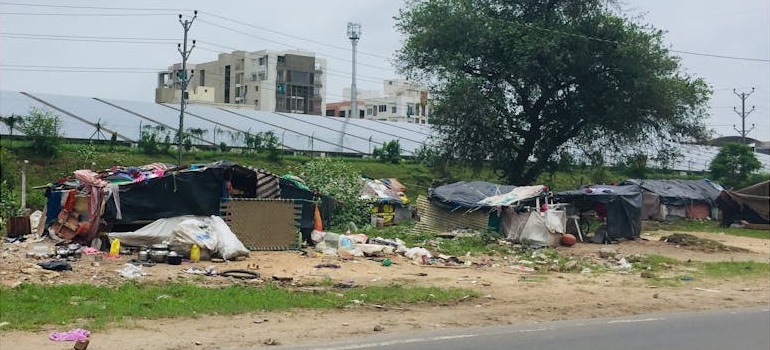Addiction is one of the main problems affecting the physical and mental health of individuals. The number of cases of drug addiction and use in society is rising daily. Many different elements influence an individual’s propensity to addiction. Social environment, early life experiences, and genes can be involved. This complex understanding of addiction susceptibility across generations advanced the field of addiction treatment. Acknowledging the problem is the initial step towards breaking free from the damaging loop that traps entire families. Here, at Harmony Ridge Recovery Center WV, we offer you a new chance to start your recovery.
Defining Addiction
Substance abuse or drug abuse is an excessive consumption of a drug or other chemical substances. Addiction is centered on an intense, insatiable need to use a substance or engage in an activity. Addiction takes many different forms. These include substance addiction such as nicotine, alcohol, opioids and stimulants, or behavioral addictions like gambling, gaming, and compulsive shopping. Addiction can develop from a variety of causes. Often, it happens when someone takes a substance just to satisfy their curiosity or to blend in with their peers. In other cases, it begins as a coping mechanism for stress, depression, anxiety or other problems. For instance, someone may use alcohol or drugs to momentarily feel better if they feel negative emotions.
Addiction causes significant brain changes that affect a person’s ability to process and react to stimuli. Being unable to stop substance use can seriously harm a person’s health, relationships with friends and family, and quality of life. Addiction, in whatever form, is characterized by three common traits
- Tolerance – the need for a greater amount of substance to produce the same effect.
- Withdrawal – symptoms upon stopping the substance or behavior.
- Continued use – ongoing use despite awareness of the risks.

Addiction Susceptibility Across Generations
Addiction does not occur to one individual; it can impact entire family. This implies that you may be more susceptible to addiction if someone in your family has a problem with it. It is important to understand how it spreads across families and to look for addiction therapy that works for you.
Firstly, the family and childhood are important factors in the propensity to addiction. Being raised in surroundings where substance use is common or in which parents show addictive behaviors can raise the likelihood of an individual becoming addicted in the future. Negative childhood experiences that impact coping strategies and emotional responses, such as neglect, abuse, or dysfunctional family, can also increase a person’s susceptibility to addiction. Moreover, experiencing trauma and stress might raise one’s susceptibility to addiction. Emotional, psychological, and physical trauma can interfere with neural systems that regulate reward and stress responses, making substance abuse more likely. The link between trauma and addiction susceptibility across generations can be seen through the frequent co-occurrence of substance abuse with PTSD and other trauma related disorders.
The Children of Addicted Parents
Having parents who battle addiction may be extremely difficult for children. When parents battle addiction, it is challenging for them to put their children’s needs first and to give them care and support. Children of addicted parents go through a variety of emotions, such as
- Anger and resentment – children may feel anger at their parents for failing to provide for them.
- Guilt – children may feel bad about not being able to help their parents.
- Fear – children are put in uncomfortable situations because their parents behave an unpredictable manner due to their addiction.
- Confusion – children can’t comprehend why their parents behave in a different way or occasionally appear emotionally detached.

Addiction can have an impact on a child’s behavior and social connection. They can struggle at school due to the lack of support or instability at home. Also, they can find it difficult to build solid relationships and to trust other people. Being in confusion and crisis all the time, can affect their self-esteem. However, they can conquer hardships and create good lives for themselves with the correct help and guidance. It is not inevitable for a child to develop addiction if there is a family history of drug and alcohol addiction. If you are a parent battling addiction, you should consider going to family or marriage therapy.
Genetic Factors Affecting Addiction Susceptibility
Studies have consistently shown that there is a strong heritable component to addiction, differences in particular genes can affect an individual’s propensity to develop an addictive condition. Dopamine, serotonin, and opioid receptors are neurotransmitter systems which are among the main subjects of genetic research in addiction. Dopamine, known as the reward neurotransmitter, is essential to the brain’s reward system, which is strongly linked to addiction. During substance use, the brain gets filled with dopamine and produces less of it naturally. Differences in genes encoding dopamine receptors impact people’s reward responses and their propensity to seek out addictive drugs or behaviours. For instance, changes in the DRD2 gene affect the brain’s dopamine receptor density, which influences pleasure perception and may make an individual more susceptible to addiction.
Furthermore, genetic differences in opioid receptors also alter how the body reacts to the opioids. They influence the degree to which pain, relief, and euphoria are felt as well as increase the risk of addiction. Although genetics provide the foundation, a person’s susceptibility to addiction is greatly influenced by stress, trauma, peers, and the availability of substances.
Epigenetic Factors
Epigenetic mechanisms are important because they affect how addiction susceptibly is passed down across generations. They include changes in gene expression patterns without changing the underlying genetic code, in contrast to genetic changes that affect the DNA sequence itself. DNA methylation is one of the main epigenetic mechanisms linked to addiction susceptibility. Genes linked to the risk of addiction can have their expression influenced by methylation patterns, which are inherited and can last for generations. Other epigenetic mechanism linked to addiction are histone modifications. The proteins known as histones are those around which DNA is wrapped. Changes to these proteins can impact how DNA is packed and, therefore, its accessibility for gene expression.
A History of Mental Health Issues in the Family
Even if a child does not come from a family with a history of addiction, mental health issues can contribute to future substance use problems. A significant number of mental health issues are impacted by genetic predisposition. Children from families with a history of mental health issues have a higher risk of developing them. If you suspect your child is misusing drugs or alcohol, you should evaluate any family history of mental health issues. The simultaneous presence of mental health issues and substance abuse is known as “dual diagnosis.” Children and adolescents who suffer from dual diagnosis need to get into an inpatient program in WV right away. Some of the mental health issues impacted by genetic predisposition are
- Bipolar disorder
- Borderline personality disorder
- Depression
- Anxiety

Cultural and Environmental Factors Affecting Addiction Susceptibility
Cultural factors also contribute to the susceptibility to addiction. They influence attitudes towards substance use within various civilizations. The misconceptions and the stereotypes of addiction in a given culture might have an effect on people’s desire to get treatment and seek assistance. Cultural customs that involve drug or alcohol consumption can normalize addictive behaviors. In addition, the physical environment influences the susceptibility to addiction through neighborhood features, urbanization, and accessibility to recreational resources. Social isolation in urban settings may lead to a rise in substance use as a coping strategy.
Neighborhood characteristics like criminal activity and the existence of drug-selling groups can also have an impact on the risk of addiction. Additionally, another important environmental component is access to addictive substances or behaviors. Addiction susceptibility across generations can be greatly affected by the accessibility and cost of alcohol, drugs, casinos, or online gaming platforms. As alcohol is the most accessible today, many families need to look for alcohol rehab in WV.

The Interplay Between Cultural, Environmental, and Genetic Factors
The interaction of culture, environment, and genetics influence individual susceptibility to addiction. The way that society views drugs or alcohol consumption either increases or reduces genetic predispositions to addiction. For example, in societies where alcohol consumption is normalized, people who are genetically predisposed to alcohol addiction may be more prone to develop harmful drinking habits. Environmental factors further complicate this interplay. Environmental factors that might worsen genetic susceptibility and increase the emergence of addictive behaviors include peer pressure and exposure to peers who use drugs.
On the other hand, supportive and positive environments can successfully reduce the genetic risks linked to addiction. People can better control their genetic predispositions when they live in environments that value health and wellness. Supportive homes, positive peer influence, and chances for physical activities manage genetic predispositions. In such environments, outpatient treatment is a solution for some. Furthermore, easily available mental health services and strong community relationships are also beneficial.
Adolescents and Addiction
Substance abuse is more common among adolescents as peer groups have a big influence. Peer groups are quite important in influencing youth and early adulthood, especially when it comes to drug use and riskier activities like gambling. The beginning of substance use, and the emergence of addictive tendencies can be attributed to peer pressure and social acceptance. The possibility that someone will take up addictive behaviors in order to fit in or manage social demands may rise in societies that normalize substance use. Moreover, the media’s portrayal of substance abuse and addiction greatly impacts how adolescents react. Images of substance use in the media that glamorize it have the power to influence attitudes and actions among younger audiences.
By encouraging wise decision-making and resistance to peer pressure, healthy habits can reduce the harmful effects of the media. Also, by being active in your child’s life, you can discover any difficulties they might be facing. Make every effort to get to know their peers, find solutions to their problems, and inform them about substance abuse treatment in WV.

Consider Getting Help
You don’t have to let addiction dictate your destiny. Breaking the pattern is a complex process that demands both physical and psychological aspects. The first step toward recovery for those battling addiction is making the crucial choice to admit the problem and make a commitment to be better. The next thing is detoxification which will cleanse the body of toxins. Detoxification should be combined with medical attention at a drug rehab to control withdrawal symptoms and to treat deeper health issues that are made worse by addiction. Breaking the cycle of addiction goes beyond treating physical symptoms, it also includes treating deep emotional traumas that may have contributed to substance abuse.
Effective Strategies for Breaking the Cycle
There are strategies to end the vicious cycle and stop addiction susceptibility across generations. Some of the strategies to break the addiction cycle include
- Education and awareness – it is critical to deal with the stereotypes attached to addiction since they can prevent people from getting the support they require and from asking for assistance.
- Healthy coping mechanisms – it can be less likely to turn to substance use if you find healthy coping mechanisms for stressful situations, such as working out or engaging in hobbies.
- Seeking support – here, therapy, counselling, and support groups are essential because they provide a secure environment in which people may examine their emotions and recognize their triggers.
Crucially, it takes courage and determination to overcome obstacles and failures in order to end the cycle of addiction. Although relapses can happen, they do not indicate a defeat. Instead, it is a chance to reevaluate tactics and strengthen your willpower.

We cannot attribute substance usage in society to a single factor. Various factors interact to increase substance usage among individuals. Keep in mind that learning about addiction susceptibility across generations and its effects on your body and mind will help you make better choices. Never forget that there are always people who care about you and want to support you. If one of you is struggling with addiction, we can make sure that you and your family have a healthier and better future.



